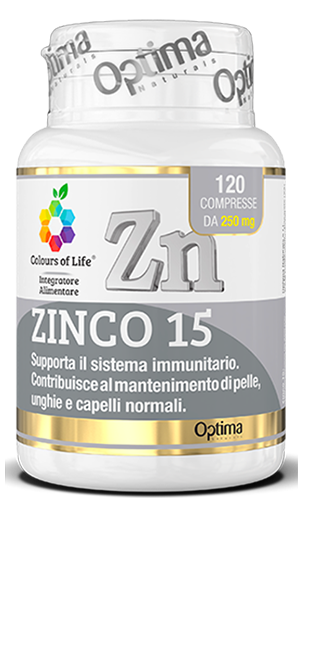BLOG
Zinc: what it is used for, benefits and deficiency symptoms

-
Zinc is an essential mineral for the good health of the body, which needs very small amounts of this mineral on a daily basis. The term 'essential' means that zinc must be introduced through the diet when possible, or through dietary supplementation when necessary, as we are unable to produce it.
What is Zinc?
Zinc is a mineral with important antioxidant properties necessary for the activity of more than 100 enzymes and numerous functions in the body.
These include:
- cell metabolism,
- proper functioning of the immune system,
- protein synthesis,
- the metabolism of carbohydrates and lipids,
- DNA creation,
- the health of skin and hair,
- sight and the senses of taste and smell.
Adequate zinc levels are also important to support a healthy pregnancy and the growth and development of the child.
Zinc and nutrition
Since our bodies cannot produce zinc, it is necessary to introduce it in adequate quantities through the food we eat, or, in the case of a deficiency, through supplements. In fact, even if the diet is not necessarily low in zinc, this mineral may not be bioavailable for absorption (see section on "Sources and insights", 1).
For example, although cereals and legumes generally contain this mineral, the simultaneous presence of phytic acid inhibits its absorption. Of the foods richest in zinc, those with the best bioavailability are protein foods of animal origin (including oysters, red meat, liver, poultry, eggs, milk and dairy products). Walnuts, peanuts, cashews, pine nuts and sesame seeds are also good sources of zinc.
The main health benefits of zinc
Let's take a look at the main benefits of zinc for the body and why it is useful to take it, either through food or supplementation.
Supports the functioning of the immune system
Zinc supports a well-functioning immune system: if you are deficient in zinc, you are more likely to get infections, even repeated infections, and you are more likely to fall ill.
According to a study published in PubMed, proper zinc intake may help reduce the duration and severity of the common cold in healthy people.
Helps reduce oxidative stress and inflammation
Thanks to its antioxidant action, it helps reduce oxidative stress, which is responsible for promoting inflammation in the body. Inflammatory states create the conditions for many chronic diseases, especially in the elderly (see section "Sources and insights", 3).
Faster healing of wounds and scars
Zinc is used as a natural medicine to relieve burns and wounds, as it
- participates in the formation of collagen,
- improves the response of the immune system,
- relieve inflammation,
factors indispensable for the successful healing of a wound or scar.
Promotes skin and hair balance
Zinc is involved in the production of sebaceous glands. It helps the skin regain its natural balance, promotes the renewal of skin tissue and helps strengthen the hair.
Improves sense of smell, vision and memory
This mineral is necessary for the proper functioning of the sensory and cognitive faculties, and a deficiency can affect the sense of smell, vision, memory and mental clarity. In particular, zinc supplementation appears to slow down the progression of age-related macular degeneration (source: PubMed).
Signs of zinc deficiency
Let us now look at some of the symptoms that may suggest a zinc deficiency situation.
- low immune defences, tendency to fall ill,
- difficulty in wound healing,
- dry skin and acne,
- dry and brittle hair, hair loss,
- nails that break or have white spots,
- poor mental clarity and attention disorders,
- loss of taste and smell,
- loss of appetite,
- sleep disorders and fatigue.
If you are experiencing any of these symptoms, it is advisable to consult your doctor before embarking on dietary supplementation, especially if you have a medical condition or are undergoing medication. As regards the dose to be taken, always follow the instructions on the packaging.
Insights and scientific studies
The advice is for information only and should not replace medical assistance. Please consult a doctor or health care professional before trying any remedies.
ZINC 15









 Optima Naturals S.r.l. ® Via Sempione 124, 21029 Vergiate (VA)
Optima Naturals S.r.l. ® Via Sempione 124, 21029 Vergiate (VA)